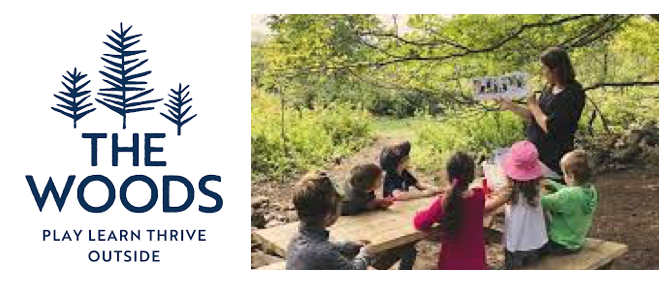The Woods–October 28, 2022
It’s been quite a while since I’ve been inside an elementary school, at least a couple of years, so when I was given the opportunity to visit Origins Academy at The Woods, Nature-Based Learning Centre during my stay in New Brunswick, I was thrilled to say the least. When I walked into The Woods all of my senses were immediately fired up, in a very good way. The sounds of children’s conversations and laughter and playing in the hallways and in the classrooms instantly brought me back to my elementary teaching days. These sounds always seem to evoke images and feelings of a kind of organized chaos that I remember, especially on rainy days, which was the case on the day of my visit. As I lingered in one of the main hallways, I caught myself smiling. I love the energy the space of a school can emanate. It can tell you so much about the school’s philosophy, sense of community, and day-to-day happenings. Here at The Woods, even the hallway space, with its treelined walls, was connected to the outdoors. As the centre’s name implies, The Woods provides learning and childcare from ages 15 months to 12 years through a nature-based approach. Even on rainy, snowy, wet and cold days, the children across programs spend a significant portion of the day outside. In fact, as I toured around the centre with the owner and principal, Dr. Erin Schryer, we came across a group of grade 2 students pouring out their water-filled boots after a morning of outdoor exploration. At the centre, there are four programs, The Adventurers childcare, Origins Academy Elementary School, The Woods After School Nature Program, and The Wood’s Nature Camp (you can read more about each program here). During my visit I learned about what happens in the early years, kindergarten, and primary grade programs, especially in relation to how nature and the outdoors are intertwined with language and literacy learning. At the root of all three programs is language. Language development and language-rich environments are at the core of the school’s curriculum. This was certainly apparent when I looked around and saw labels telling children the names of objects, postings of the children’s names and other creations, book nooks, and writing centres with provocations for writing and mark-making. Songs and rhymes in the early years and dialogic or shared reading experiences were also evident as I walked through the classrooms. Space for small group instruction, which I saw happening in quiet lesson-focused rooms, provided enriched and focused opportunities for talk, vocabulary growth, social connectedness, and the chance to hone in on reading skills. Foundations of language and literacy are central to the learning going on throughout the school and the entire centre. As Dr. Schryer described, evidence-based language and literacy instruction sets a basis for creating, problem-solving, knowledge-building, and thriving in all contexts, including the outdoors. A structured literacy approach, in particular, has been essential to how early literacy and reading skills are taught at the school. I find it interesting (and refreshing) that this type of evidence-based instruction that emphasizes explicit and systematic instruction in decoding and language-related skills is at the core of an outdoor-centred school. And why wouldn’t it be? The research is certainly clear about how reading develops and the skills that should be included in any early reading program, irrespective of the school’s overall philosophy. A balance between outdoor learning and explicit reading instruction was certainly felt during my visit and in conversation with Dr. Schryer. But beyond that was also a connectedness, a flow from the indoors to the outdoors. Explicit instruction in reading was also happening in the outdoor classrooms, as indicated by the designated spaces for group discussions and lessons. This appeared to be in conjunction with the projects happening in these outdoor environments as well as the implicit language learning that often occurs through productive conversations where the teacher acts as a facilitator by asking open-ended questions for continued inquiry. Through collaborative and experiential learning, the children were indeed applying their language and literacy skills to their inquiry projects, enriching their vocabularies and building their knowledge about topics of interest. I’m grateful to Dr. Schryer and her team for the warm welcome into The Woods. I have gained an appreciation for the work that comes with striving and maintaining teaching excellence through a nature-based approach to learning. I will certainly continue to reflect on the benefits of outdoor learning and how it can connect and even enhance a literacy program (or perhaps the relationship between outdoors and literacy is a reciprocal one, each benefiting from the other). This will be on my mind as I visit other schools and hear about their philosophies as well. -Pamela

The Woods-October 28, 2022